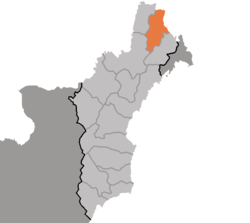Kyongwon County
|
Kyongwon County 경원군 |
|
|---|---|
| County | |
| Korean transcription(s) | |
| • Hanja | 慶源郡 |
| • McCune–Reischauer | Kyŏngwŏn-gun |
| • Revised Romanization | Gyeongwon-gun |
 |
|
| Country | North Korea |
| Region | Kwanbuk |
| Province | North Hamgyong |
| Administrative divisions | 1 ŭp, 3 rodongjagu, 21 ri |
| Area | |
| • Total | 888 km2 (343 sq mi) |
| Population (2008) | |
| • Total | 107,327 |
Kyŏngwŏn County is a kun, or county, in North Hamgyong province, North Korea, located at 42°48′41″N 130°11′58″E / 42.81139°N 130.19944°ECoordinates: 42°48′41″N 130°11′58″E / 42.81139°N 130.19944°E, formerly known as Saebyŏl. It is bordered by the People's Republic of China to the north and east, Kyonghung to the southeast, Hoeryong to the southwest, and Onsong to the west.
The western region of Kyongwon is mountainous, while the east is relatively flat. The highest point is Chungsan. The largest river is the Tumen, which flows along the eastern border. Numerous tributaries of the Tumen also flow through the county. Approximately 75% of the county is forested.
Aside from agriculture, livestock raising and sericulture are widespread. The chief local crops are rice, corn, and soybeans. Bituminous coal is also mined.
Railroads passing through Kyongwon include the Hambuk and Kogonwon Lines. It is also connected by rail to the Chinese city of Hunchun in the Yanbian autonomous prefecture.
...
Wikipedia
